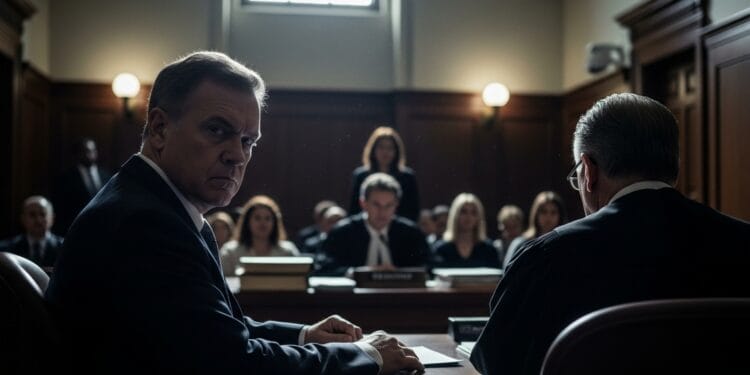A quiet tremor ran through the digital asset world this week. A U.S. appeals court overturned the conviction of Nathanial Chastain, a former product manager at OpenSea. He had been found guilty of wire fraud and money laundering. This decision throws a spotlight on a fundamental question: What exactly counts as “property” in the fast-moving crypto space?
- The appeals court overturned the conviction of Nathanial Chastain, a former OpenSea product manager, due to issues with jury instructions. The core issue revolved around the definition of “property” in the context of digital assets.
- The court questioned whether confidential information about NFT listings constituted “property” in a legal sense, which is crucial for fraud convictions. The ruling highlights the challenges of applying traditional laws to new technologies.
- The case may see further action, such as a new trial or the prosecution dropping the charges. The ruling underscores the ongoing need for clarity in crypto regulations.
Chastain’s case was a landmark. Prosecutors called it the “first ever digital asset insider trading scheme.” He faced charges in June 2022. The accusation was clear: He used confidential information about which NFTs would appear on OpenSea’s homepage. He bought these NFTs before their public listing, then sold them for two to five times his original price.
Think of it like this: Imagine working at a major art gallery. You know which paintings will hang in the main hall next week. You buy them up cheap before the announcement. Then you sell them for a quick profit once they become famous. That is the essence of what Chastain was accused of doing, but with digital art.
He was convicted in May 2023. The sentence followed in August: three months in prison and three years of supervised release. It seemed a clear win for prosecutors. They aimed to show that traditional fraud laws could apply to the new world of NFTs.
The Property Question
The appeals court, however, saw things differently. Their order, filed on Thursday in the U.S. Court of Appeals for the Second Circuit, agreed with part of Chastain’s appeal. The core issue was how the jury was instructed. It came down to the definition of “property.”
Chastain argued that the district court made a mistake. The jury was told it could find him guilty of defrauding OpenSea of its property. This could include an “intangible interest unconnected to traditional property rights.” Chastain said this instruction was wrong. The appeals court agreed with him.
This is where the legal gears grind. For fraud to occur, there must be an appropriation of property. The court said, “We cannot say that the jury would have reached the same verdict if it had been properly instructed that fraud requires the appropriation of a property interest rather than unprofessional business conduct.”
It sounds like legal jargon, but it is important. Was the confidential information about NFT listings actual “property” in a legal sense? Or was it just “unprofessional business conduct”? The difference matters a great deal for a conviction.
This decision highlights a recurring challenge in crypto law. Old laws meet new technologies. Concepts like “property” or “security” get stretched. Sometimes, they break. The courts are trying to figure out how to apply existing frameworks to assets that did not exist when those laws were written.
It is a bit like trying to fit a square peg into a round hole. Sometimes it works, sometimes it needs a new hole. In this case, the court felt the hole was not quite right for the peg.
Beyond the Conviction
During the legal process, Chastain also brought up an interesting point. He accused OpenSea founder Devin Finzer of similar behavior. Chastain suggested Finzer bought MATIC tokens before OpenSea announced it would integrate the blockchain associated with MATIC onto its NFT platform.
Chastain’s point was strategic. He suggested that if Finzer “us[ed] similar company information for personal benefit,” it would show that the cofounder “didn’t believe company policy precluded officers or employees from using similar company information for personal benefit.” It was a way to muddy the waters, to show that perhaps the company’s own standards were not so clear.
This kind of argument often surfaces in these cases. It tries to establish a pattern. It aims to show that what one person did was not unique. It suggests the rules were perhaps not as strictly enforced or understood as prosecutors claimed.
The appeals court’s decision does not mean Chastain is innocent of wrongdoing. It means the legal process, specifically the jury instructions, had a flaw. The case might see further action. It could be sent back for a new trial with proper instructions. Or the prosecution might decide not to pursue it further.
For the crypto space, this ruling is a reminder. The legal landscape is still forming. What is considered insider trading in traditional markets might not perfectly translate to digital assets. The definition of “property” for digital information remains a battleground.
This case will be studied by legal teams and crypto companies alike. It adds another layer to the ongoing discussion about regulation. It shows that even when prosecutors think they have a clear case, the courts might find a subtle but significant legal distinction. The digital asset world continues to challenge old legal definitions, forcing a re-evaluation of what we thought we knew.

















